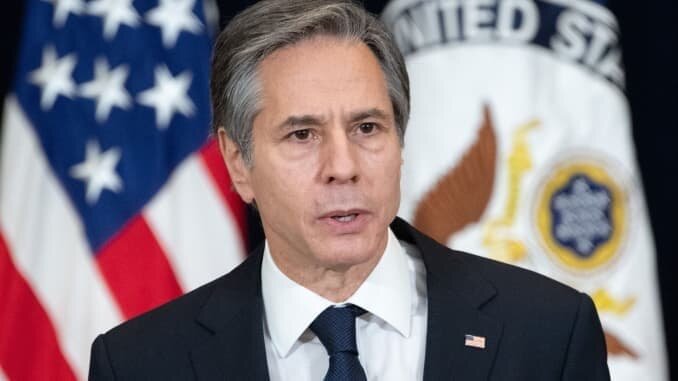Blinken discusses Iran with British, French, German ministers

TEHRAN - U.S. Secretary of State Antony Blinken discussed Iran and other issues on Friday in a virtual meeting with his British, French and German counterparts as the group weighs how to revive the Iran nuclear deal, Reuters reported.
The U.S. State Department said beside Iran, other issues including the coronavirus pandemic, Myanmar, Russia, China and climate change were also discussed and Blinken “underscored the U.S. commitment to coordinated action to overcome global challenges.”
“We just had an in-depth and important conversation on Iran ... to handle together nuclear and regional security challenges,” French Foreign Minister Jean-Yves Le Drian said on Twitter.
Britain’s Dominic Raab and Germany’s Heiko Maas also took part in the meeting.
"The E3 and the U.S. discussed how a united approach could address our shared concerns towards Iran," UK Foreign Secretary Dominic Raab said in a statement about the meeting, according to DW.
Shortly before Trump announced the U.S. would leave the deal, Prime Minister Boris Johnson wrote an opinion piece in The New York Times urging Donald Trump to stay in the agreement, with Johnson calling withdrawal "a mistake.”
The high-level conversation is the latest step by President Joe Biden’s new administration to explore how to restore the 2015 nuclear deal that Iran signed with world powers but was abandoned in 2018 by Biden’s predecessor, Donald Trump.
The nuclear deal limited Iran’s uranium enrichment activity in exchange for termination of economic and financial sanctions.
In abandoning the deal approved by former President Barack Obama, Trump restored the U.S. sanctions it had removed and then piled on more.
Speaking before Friday’s meeting, a source familiar with the matter said it was unlikely to delve into great detail on Iran and was a first chance for the ministers to discuss the issues.
According to CNBC, the meeting came after President Joe Biden’s National Security Council met Friday afternoon to discuss the administration’s approach to Iran.
“The meeting today is part of an ongoing policy review. It is not decisional,” White House spokeswoman Jen Psaki said on Twitter.
Biden, who took office last month, has said that if Tehran returned to strict compliance with the 2015 nuclear pact, Washington would follow suit and use that as a springboard to a broader agreement that might restrict Iran’s missile development and regional activities.
Tehran has insisted that Washington lift sanctions before it resumed compliance, and ruled out negotiations on wider security issues. But Foreign Minister Mohammad Javad Zarif hinted on Monday at a way to resolve the impasse over who goes first by saying the steps could be synchronized.
“JCPOA has a mechanism built into the deal that is the Joint Commission. And the Joint Commission has a coordinator. The coordinator has two hats – it used to be Federica Mogherini now it is Josep Borrell. He has two hats: One hat is he is the high representative of the European Union for foreign defense policy. The other hat is the coordinator of the Joint Commission. He can put his hat as the coordinator of the Joint Commission and sort of choreograph the actions that are needed to be taken by the United States and the actions that are needed to be taken by Iran,” Zarif said in an interview with the CNN late on Monday.
Exactly one year after Trump quit the deal and started to implement his “maximum pressure” campaign against Iran, the Islamic Republic announced that its “strategic patience” is over and started gradually remove limits on its nuclear program at bi-monthly intervals. At the time Iran announced that if the remaining parties to the JCPOA, especially the European trio – Germany, France, and Britain –, protect Iran from the sanctions Iran will reverse its decisions.
Zarif, a former Iranian ambassador to the UN, said that Iran has acted in accordance with dispute mechanisms written into the JCPOA, since the U.S. withdrawal. "Iran used the mechanisms in the nuclear agreement in order to limit its cooperation. If you read paragraph 36, we acted in strict accordance with the nuclear agreement," Zarif said in his interview with CNN.
(Paragraph 36 provided a mechanism to resolve disputes and allows one side, under certain circumstances, to stop complying with the deal if the other side is out of compliance.)
Analysts say it is the U.S. that must first return to the JCPOA because it was the U.S. that left the agreement.
Iran is still a party to the nuclear deal and is still implementing some terms of the agreement.
PA/PA
